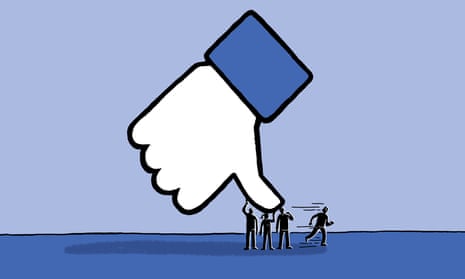The problem with the dispute between the Australian government and the two social media giants Google and Facebook is that it’s a squalid argument between ethically challenged contestants about a really important question – the survival of liberal democracy.
The Australian parliament is in the process of passing a law – called the News Media and Digital Platforms Mandatory Bargaining Code – which would force Facebook and Google to pay publishers if they host their content. The law is a response to complaints from Australian news outlets about the role that both have played in the decline of journalism and the destruction of their business model.
The two companies have responded in different ways: Google is making deals with Australian news publishers – including Guardian Australia, part of GNM, also publishers of the Observer; Facebook is cutting them off entirely. It is preventing publishers and Facebook users in Australia sharing or viewing Australian and international news content. In its typically crass style, the company implemented this ban immediately, clumsily and without warning, with the result that many important public and other services (including, for example, the fire service) were caught in the censorship net.
This in turn prompted a furious, self-righteous response from the Australian prime minister, Scott Morrison – published (and I am not making this up) on a Facebook page. “Facebook’s actions to unfriend Australia today, cutting off essential information services on health and emergency services, were as arrogant as they were disappointing,” he wrote. “They may be changing the world, but that doesn’t mean they run it.”
Those last six words capture the essence of the problem. The past three decades have seen the rise of five huge global corporations – Alphabet (owner of Google and YouTube), Amazon, Apple, Facebook and Microsoft, each of which wields monopolistic power in its own and contiguous domains. These companies have grown in a largely law-free environment – in the sense that they operated in domains where there was either little applicable law, or where there was no government interest in applying existing law.
Now they bestride the world, having seen their valuations, and their perceived role as critical infrastructure, amplified by the pandemic. Their leaders see themselves (though, of course, they do not express this in public) as the new masters of the universe. And so they are shocked and irritated when mere national governments fail to recognise their elevated status.
Google’s and Facebook’s initial responses to the Australian proposals oozed with this hubris. Didn’t these dumb Aussies understand that news outlets needed them more than they needed the outlets? Without Google search, many readers wouldn’t find the news they were looking for. And the same ungrateful outlets were desperate to publish and publicise their content on Facebook. Surely the Morrison government was bluffing?
As it happened, it wasn’t and the bill will become law. In one sense, that’s important because it establishes the principle that democratically elected governments, not tech companies, decide what happens in their jurisdictions. And that’s vital, because a working democracy cannot have unaccountable corporate powers loose on its patch. If we’ve learned anything over the past 150 years, it is that you can have democracy or you can have monopolies, but you can’t have both.
The tragedy is that the passage of Morrison’s law is actually a pyrrhic victory. One of the principles of warfare 101 is never to fight on territory chosen by your opponent. Democratic governments have been ignoring this, allowing discourse about technology and society to be captured by a deterministic narrative which says that tech drives history and society’s only role is to mop up after it has wreaked its “creative destruction” (to use Joseph Schumpeter’s famous phrase). In the process, governments everywhere bought into the myth that to challenge the arrogant intrusiveness of tech companies carried with it the risk of being portrayed as opposed to “progress”.
Since 2016, there has been a growing realisation that this narrative has to be challenged. The question now is not how can democracies mitigate the harms inflicted by tech companies on society, but what will democracies permit – and, more importantly, prohibit – tech companies to do? Which business models will we deem acceptable, and which will we outlaw? What, in other words, does democracy want from tech, not the other way round?
Applying that to the Australian case, the argument that the government should have been making was not about payments for linking to news outlets but that a vibrant, functioning democracy needs independent journalism capable of providing reliable information to citizens. Given that the social media giants have polluted the public sphere with disinformation, hatred and lies, and destroyed a business model that once funded good journalism, the companies should be subjected to a tax used to support that same good journalism. A bit like the BBC licence fee, in other words. It is the price they have to pay for the consequences of their ultra-profitable business models and insane profit margins. And for the privilege of being allowed to exist in a democracy.
The dominance of the five tech giants represents the same existential threat to liberal democracy that Louis Brandeis saw in the huge industrial trusts of early 19th-century America. The Silicon Valley narrative that sees democracies in the role of the guy who followed processional elephants during the Indian Raj, sweeping up their dung, is as ridiculous as it is pernicious. It is high time we called the industry’s bluff.
John Naughton chairs the advisory board of the Minderoo Centre for Technology and Democracy at the University of Cambridge

